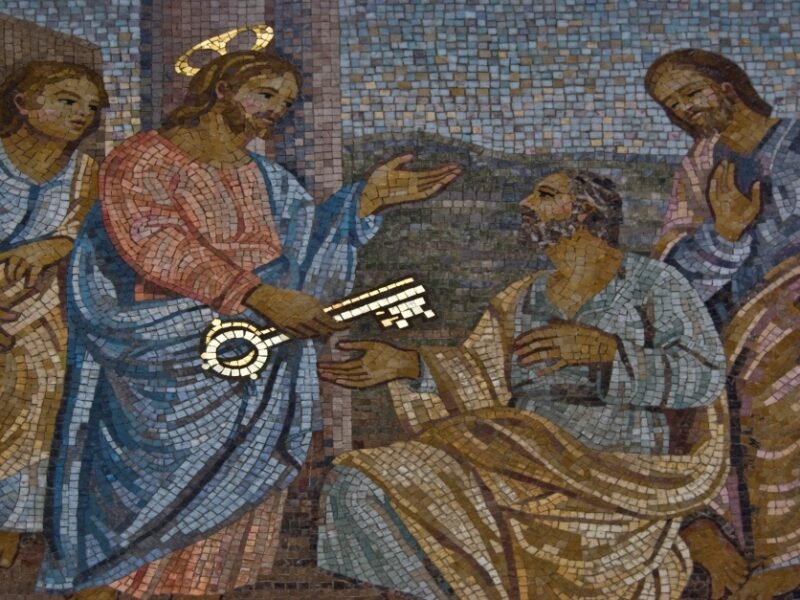When moral and political injustices abound unchallenged, the wronged contemplate violence as a recourse. For Christians who live in such a time, two questions arise: does violence better conform the world to Christ, and is violence committed for righteousness’ sake justified? French sociologist Jacques Ellul considered these questions at length in a book on the subject several decades ago.[1] In the present, this book has inspired a contemporary author known as Kruptos to comment on Ellul’s work and apply it to the current American political landscape.[2] The possible ramifications of Kruptos’s suggested approach to violence are of such singular importance that I felt compelled to offer some thoughts of my own, beginning with a brief overview of how Kruptos, via Ellul, answers the two questions articulated above.
The first question—does violence better conform the world to Christ—is plainly answered in the negative. Kruptos writes that violence “is always a thing of evil and those who engage in it are increasing the evil in the world.” He adds, employing Ellul’s own words, “To use violence is to be of the world.”[3] The second question—is violence committed for righteousness’ sake justified—is also answered in the negative: “[Violence] can never be justified. It can never be made pure.” Therefore, “We must reject all attempts to justify violence on Christian grounds. Any attempt to justify violence is yet another example of the fallen nature of man.” On these two questions Kruptos is in agreement with Ellul, who says that “violence begets violence—nothing else,”[4] and “violence can never be justified or acceptable before God.”[5]
Yet Kruptos also maintains that “we, in sober humility, must do what needs to be done in any given situation.” More concretely, “Even though we can never call violence ‘good’ there are times when it is necessary,” such as in the fight against abortion:
We need to begin facing the truth of the way things are and what might be necessary to do in the future, sooner than we think. Our opponents have no problems using political violence or violence against the unborn to achieve their aims. I am afraid we will not be able to keep our hands clean for long, if they ever were clean to begin with.
In other words, Christians should be prepared to commit violence for the sake of upholding righteousness, with the understanding that “in these times of necessity, we must recognize that our actions are contradictory to the Christian life.” Attempting to remain morally uncompromised is futile and, worse, cowardly:
Should our consciences be clean anyways? Is our non-violence simply a white washing of our unwillingness to do what is necessary at the expense of the lives of millions of unborn babies? No one can live in the world of necessity, and we all do, and keep their hands clean.
Kruptos cites Ellul in support of this conclusion, saying that for Ellul “the refusal to use violence in the face of violence, the refusal to use violence in order to protect the oppressed is in fact a form of passive violence.” Violence is “a necessity,” Kruptos continues, and Ellul reveals his attitude toward attempted moral purity by quoting these words of Charles Péguy: “People who insist on keeping their hands clean are likely to find themselves without hands.”[6]
However, when read in their full context these selected excerpts do not support Kruptos’s reading of Ellul on this point. When Ellul says that “nonviolence is indeed ‘super-violence’ (as it has been called), because the man who in effect acquiesces in the oppression of the poor by violence, is convinced that he is thus keeping his heart pure and his hands clean,” he immediately adds, “So goes the first line of argument that leads Christians to accept the idea of violence and to associate themselves with violent movements.”[7] Ellul is evidently describing a different point of view here rather than expressing his own. Furthermore, while Kruptos writes that violence is “a necessity,” Ellul denies this:
Granted, violence is universal. But also, violence is of the order of Necessity. I do not say violence is a necessity, but rather that a man (or a group) subject to the order of Necessity follows the given trends, be these emotional, structural, sociological, or economic.[8]
The distinction between violence being “a necessity” and “of the order of Necessity” is a subtle but crucial one. The former suggests that the commission of violence is unavoidable for all people, whereas the latter, on Ellul’s account, means that violence is inevitable in the way of the world, but people who are in Jesus Christ can live nonviolently. Thus the aspiration for moral integrity in a violent world is not hopeless, and indeed, Ellul criticizes those who dismiss moral purity as a phantasmic ideal:
The temptation is always to yield to fatality, as Father Maillard does when he takes the extreme positions referred to above. “All life is a struggle,” he says. “Life itself is violent. And it is in struggling that we realize ourselves. Every action is necessarily imperfect and impure…. We are caught in a terrible machine which can thrust us into situations of violence in spite of ourselves. Let us distrust the temptation to purity.” But Father Maillard confuses the situation he perceives so realistically with the will of God.[9]
In the same vein, although it is true Ellul quotes the words of Péguy cited by Kruptos, he does so in order to repudiate them: “To reject radical [i.e., nonviolent] Christianity in order to plunge into action may be the thing for people who have a passion for action, but it is to reject Christianity itself.”[10] Ellul then goes on to say that the determination to pursue Christian ends through un-Christian means signifies a loss of faith:
This diminishment of the Wholly Other who has been revealed to us, this recourse to violence and to political and economic methods to express Christianity, is an admission that faith in the possibility of God’s radical intervention, faith in the Holy Spirit, has been lost. Obviously, God intervenes radically only in response to a radical attitude on the part of the believer—radical not in regard to political means but in regard to faith; and the believer who is radical in his faith has rejected all means other than those of faith. The appeal to and use of violence in Christian action increase in exact proportion to the decrease in faith.[11]
There are numerous problems with Ellul’s theory of violence, not least his overly expansive definition of “violence” and his belief that Christian political action is unavoidably compromised. But if he gets anything right, it is the fact that the determination to do whatever is “necessary,” without restriction, is spiritual poison. Those who go down this path will be dead men on their feet, their lips uttering words of righteousness triumphant even when the Spirit of life has long since departed them. What is more, on Kruptos’s own account they will accomplish nothing, for as he points out, again echoing Ellul, “Violence can never create either liberty or justice.”[12] It makes sense for Ellul to affirm this, as he holds out the alternative of radical Christian nonviolence. For Kruptos, on the other hand, to declare the futility of violence even as he says we must be resolved to commit violence and thereby compromise ourselves yields an approach that is doubly stillborn as an option for Christian action, being not only morally hideous, but logically incoherent.
The weight of this world still lies, as it has from time immemorial, on God rather than us. The yoke of moral restraint is easy, and the burden of waiting on God’s providence light, compared to the unbearable load of trusting only in ourselves to do what is “necessary”:
We are told that the Christian cannot take refuge in contemplation or pious prayers, that praying does not mean waiting passively for God to act on our behalf; that, on the contrary, praying means that we too must act. All of which is perfectly true. But then some people go to the other extreme and insist that we must do everything ourselves—“Help yourself (and, possibly, heaven will help you)!” Thus to stress human means—usually including violence—is in effect to stake everything on those means.[13]
That said, let no one charge me with counseling inaction, save prayer. In fact, I hold that the scope for righteous action is considerably wider than either Ellul or Kruptos grants, supposing as they do that violence is by definition “of the world,” and that such innocuities as economic competition and scientific endeavor qualify as violence. However, given that Kruptos does not specify what exactly it is that may be “necessary” for us to do, so too will I not delineate the precise boundaries for action, beyond which no Christian should dare venture—that is a discussion for another occasion. My present purpose is to maintain that such boundaries exist by God’s eternal ordinance, and we scorn them at our own peril. The necessity placed on us is not to violate these boundaries in the name of righteousness, but to respect them while not wrongly broadening or narrowing them.
Notes
- Jacques Ellul, Violence: Reflections from a Christian Perspective, trans. Cecelia Gaul Kings (New York: The Seabury Press, 1969). ↑
- Kruptos, “Christian Realism and the ‘Necessity’ of Violence,” Seeking the Hidden Thing, 9 May 2022, https://www.seekingthehiddenthing.com/p/christian-realism-and-the-necessity. ↑
- Ellul, Violence, 129. ↑
- Ellul, Violence, 100, italics original. ↑
- Ellul, Violence, 138. ↑
- Ellul, Violence, 147. ↑
- Ellul, Violence, 35. ↑
- Ellul, Violence, 91, italics original. ↑
- Ellul, Violence, 129. ↑
- Ellul, Violence, 148. ↑
- Ellul, Violence, 149. ↑
- Compare Ellul, Violence, 102. ↑
- Ellul, Violence, 149‒50, italics original. ↑







'Violence and “Necessity”: A Corrective' has no comments
Be the first to comment this post!